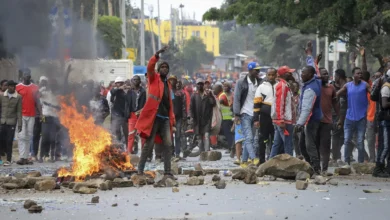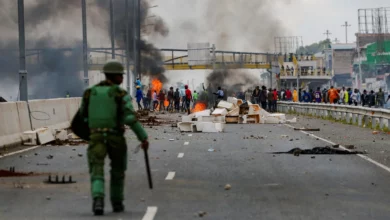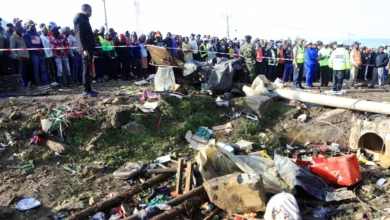MOGADISHU – Kenyan tanks, artillery and hundreds of fighters are moving through militant territory in Somalia, residents said Monday.
Fighter jets and helicopters have been flying overhead since Kenyan forces moved en masse into Somalia on Sunday. The invasion came one day after Kenyan defense officials said the country has the right to defend itself against al-Shabab militants after a string of kidnappings inside Kenya. Four Europeans have been abducted and one killed.
Witnesses in the Somali town of Dhobley on Monday said an estimated 40 Kenyan military vehicles entered the town on Sunday. Ali Abdullahi, a resident in Dhobley, said the army vehicles were towing what he described as "big guns."
No large-scale fighting has yet broken out, the residents said.
Late Sunday evening, a military helicopter crashed and caught fire inside Kenya from an apparent mechanical malfunction, a diplomat and a resident said. No civilian casualties were reported but the status of the pilots on board was not immediately known.
Kenya's government spokesman, Alfred Mutua, said Kenyan troops "are pursuing al-Shabab across the border." He did not give any other details.
In response, al-Shabab, Somalia's most dangerous militant group, tried to raise the alarm in areas it controls. Residents in the town of Qoqani who asked not to be named for fear of reprisals said militants were going into homes and forcibly recruiting new fighters.
"Are you ready to live under Christians?" one al-Shabab official shouted on a militant radio station. "Get out of your homes and defend your dignity and religion. Today is the day to defend against the enemy."
A Somali government spokesman, Abdirahman Omar Osman, said his government welcomes logistical support from "our Kenyan brothers," but said Somalia did not need Kenyan troops.
"Our forces are ready to combat al-Shabab and they are doing so effectively. They are ready at the borders, so sending troops is not needed," Osman said.
The helicopter crashed in Liboi, a town about 20km from the Kenya-Somalia border. The Liboi resident asked not to be identified for fear of reprisals. The diplomat's employer does not allow him to be identified.
Mutua and Kenya's military spokesmen did not immediately respond to requests for comment.
Kenyan troops have frequently crossed the border into Somalia, but Sunday's push appears to be a bigger and more concerted effort. Minister of Internal Security George Saitoti told a news conference on Saturday that Kenyan forces would pursue al-Shabab into Somalia.
"For the first time our country is threatened with the most serious level of terrorism," he said.
The public declaration to attack al-Shabab came two days after armed militants kidnapped two Spanish aid workers with the group Doctors Without Borders from the Dadaab refugee camp, a sprawling expanse of temporary homes where almost 500,000 Somalis live. The population of Dadaab, the world's largest refugee camp, has swelled by tens of thousands in recent months because of Somalia's famine.
On 1 October, Somali gunmen took a wheelchair-bound Frenchwoman from her home near the resort town of Lamu. Somalis also abducted a British woman from a Kenyan coastal resort in September. Her husband was killed in the attack.
Kenya's push north into Somalia will open another front that Somali militants must contend with. African Union forces from Uganda and Burundi have expanded their control of Mogadishu in recent months and have almost completely forced al-Shabab out of the capital.




